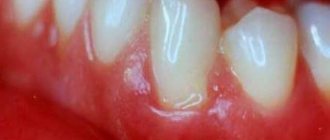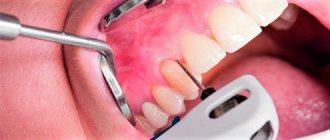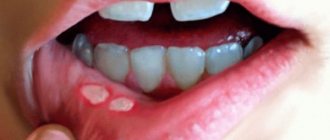Toothache during pregnancy can cause many complications in a woman.
In addition to constant aching pain in the mouth, other symptoms may appear - headache, feeling of constant anxiety.
In order to somehow block these problems, the woman tries to urgently calm the pain, and for this she uses strong painkillers, such as arsenic.
We were taught to put this substance on the tooth since Soviet times; before, it was the only remedy that blocked pain urgently and for a long time and made it possible to hold out until the morning to visit the dentist. But today progress has gone far, and arsenic is considered an outdated method, and also quite dangerous, especially for a pregnant woman. Let's look at whether arsenic can be used by pregnant women in the early and late stages.
Is it possible to put arsenic on a tooth during pregnancy?
Many dentists, most often in free provincial clinics, actively use arsenic.
Although today we know about the negative consequences of its use. First of all, this substance has a toxic effect on the body. Its effectiveness is associated with an aggressive effect on the nerves and nerve endings of the tooth.
Previously, for lack of a better option, arsenic was administered to everyone for toothache; they preferred to apply it for three to four hours every day.
And the extent to which this “therapy” affected pregnant women has not yet been fully studied. After all, today they are categorically prohibited from using arsenic for any type of pain. The fact is that in addition to being toxic, the substance also has a necrotic effect - that is, it completely kills nerve endings. And if a substance enters the body of a pregnant woman, then it is easy to imagine negative consequences for the woman and the fetus.
When is it necessary to use arsenic during treatment?
The use of arsenic itself has long been prohibited, but for acute and emergency pain, in extreme cases, a special arsenic paste is prescribed.
It is manufactured taking into account the prescribed dosage, diluted with substances that block the access of toxic elements to the body.
At the same time, the necrotic effect remains the main one, so even this relatively safe paste should not be used by pregnant women.
What is necrotic function? This is a process when cells under the influence of arsenic do not receive the necessary nutrition and die. The entire load goes to the pulp, blood stops flowing to it in sufficient quantities.
As a result, the brain stops receiving “information” from the source of pain, and the toothache itself subsides for a while. This slow destruction of the tooth, of course, can calm the sufferer, but the tooth itself is subject to such a strong impact that it can lead to its destruction.
Arsenic paste is applied for serious caries, when it affects not only the walls, but the roots of the tooth, attacks dentin and soft tissues. Damage to the nerves and pulp subsequently blocks the pain; it is not felt even when pressing on the tissue.
The substance can be kept on the tooth for a maximum of 72 hours; in the future, the paste will simply destroy its walls.
Why is the product used?
The main purpose of arsenic paste is a necrotic effect aimed at the nerve and nerve endings. As a result, the cells do not receive sufficient nutrition and die, the blood supply to the pulp deteriorates, and protein denaturation occurs. After such processes occur, the transmission of impulses from the nerve endings is blocked and the toothache goes away. On the one hand, this is a positive effect, but on the other, the tooth becomes dead and may soon collapse.
Read also: How long does arsenic kill the nerve in a tooth?
Very often the substance is used when filling canals, when it is necessary to remove a nerve. This need often arises with caries, which penetrates deep into the tooth cavity, affecting its dentin and soft tissues. Next comes damage to the nerves and pulp. A person begins to feel severe toothache, especially when pressing on the exposed area. In such cases, it is often necessary to put arsenic on the tooth.
After arsenic paste is placed into the tooth cavity, a temporary filling is made. The patient must walk with arsenic for 24 hours if a single-rooted tooth is being treated, and 48 if any other. The maximum residence time of the substance is 72 hours. Arsenic in the tooth during pregnancy is a great threat to the body of the mother and baby.
Temporary filling over arsenic
After the set time has passed, the dentist removes the temporary filling and takes out the substance, after which he cleans the tooth cavity and performs a filling.
It's simple, but the consequences of exposure to arsenic are very dangerous, especially for a pregnant woman.
Is it possible to put arsenic on a tooth during pregnancy?
If a pregnant woman tries to treat advanced caries at an early stage, she risks serious health problems for herself and the child.
When a woman has pulpitis in the first weeks of pregnancy, other medications that are more gentle will help her stop the pain.
If the dosage of arsenic exceeds 5–50 mg, it becomes fatal to humans.
But even a small dose can lead to consequences that cannot be dealt with later. First of all, this is a toxic effect on the fetus, which can subsequently affect the development and growth of the unborn child.
There is a common misconception: arsenic is acceptable for pregnant women in the third month. For some reason, it is believed that from this time onwards the use of arsenic paste is already safe.
In fact, this is a myth - arsenic paste is equally dangerous in both early and late stages of pregnancy. And its use is permissible only in circumstances where other options simply do not exist.
In what form is arsenic used?
Arsenic is not used in its pure form. It is one of the main components of arsenic pastes, which are placed in the tooth cavity for a necrotic effect on the nerve. Very often it is used in the treatment of:
- advanced caries;
- pulpitis;
- periodontitis and other dental diseases.
If the dosage of the substance exceeds 5–50 mg, it becomes fatal to a person.
That is why the percentage of arsenic in the paste is small. It also consists of additional components, including:
- a substance that provides an anesthetic effect, which allows you to get rid of toothache (dicaine, novocaine);
- antiseptics that suppress pathogenic microflora (camphor, thymol); tannin, which provides an astringent effect, which prolongs the period of use of the paste.
Dental arsenic paste with dispenser
The drug is available in dosed form, which allows you to avoid overdoses.
After applying the paste, you must strictly observe the period of its stay in the tooth and visit a doctor on time. Pregnant women should not use such pastes. Dental treatment must be carried out using other means.
Dangerous consequences for pregnant women and the fetus
The use of even arsenic paste is included in the list of prohibitions for pregnant women in any trimester.
According to doctors, self-administration of arsenic even led to coma in women.
What can we say about the negative impact on the fetus.
Firstly, arsenic is so toxic that it penetrates the body of both women and children. It has not been studied how dangerous even minor use of the drug can be.
Secondly, adverse reactions can appear immediately - this is stomach pain, this is tooth decay, these are symptoms of poisoning - loose stools, vomiting, cramps.
In addition, fever and headaches accompanied by vomiting are possible. Arsenic also affects the nervous system - this can cause insomnia, anxiety, and convulsions. It is very difficult to predict how arsenic use will affect a particular woman. It is almost impossible to predict what will happen to the body of the unborn child.
So, what problems arise from the uncontrolled use of arsenic:
- Disorders of the gastrointestinal tract;
- Neurological problems;
- The risk of miscarriage or problems with fetal development increases;
- Headaches, migraines, difficulty breathing;
- Allergic reactions are possible;
- Digestion difficulties;
- Fever, increasing abdominal pain;
- Constant diarrhea and vomiting;
- Destruction of the walls of the tooth.
As you can see, there are a lot of consequences. And this is a list of negative effects only on the woman’s body.
What is the danger for pregnant women?
The use of arsenic paste has a certain list of contraindications, which includes the period of gestation and lactation. The substance has a very negative effect on the development of the child and can cause many problems both during the period of use of the substance and after a sufficient amount of time. Arsenic should not be used in dental treatment in young children. This is associated with certain adverse reactions.
- The effect of toxic substances on the fetus and possible side effects have not been fully studied.
- It is very difficult to determine a dosage that will be safe for a child.
- There is a high risk of toothpaste falling out of the tooth cavity and its further entry into the gastrointestinal tract, which leads to poisoning of the entire body.
- A scientifically proven fact indicating the negative effect of the substance on dentin, which leads to tooth destruction.
During pregnancy, a woman already has very weak teeth, since the child takes all the useful components from the expectant mother. If you use such a paste, the tooth structure will inevitably be destroyed, not counting the toxic effect on the fetus and the body.
Dental treatment during pregnancy is carried out using safe materials
When treating a woman’s teeth during pregnancy, it is allowed to use preparations for pulp devitalization, which are very similar in their mechanism of action to arsenic paste. They consist of various components, as well as microscopic doses of arsenic. In some of them the latter substance is completely absent.
What can replace harmful products in dentistry?
Of course, women, having read horror stories about the dangers of arsenic for pregnant women, ask a logical question - what then should they take to relieve symptoms?
In fact, medicine has come a long way.
Today, pregnant women are allowed to use formulations with microscopic portions of painkillers, which hit the target without affecting other organs.
These drugs are prescribed strictly according to a doctor’s prescription, who also sets the dosage and timing of use of the medicine.
Products based on safe medicinal herbs and extracts are allowed; Nurofen and Analgin are sometimes acceptable. Again, only with the permission of a specialist, who himself will determine the need to use pills.
Typically, the dentist's office uses special medications created for pregnant women. They are relatively safe, and with the correct dosage, which can only be determined by the attending physician, they can relieve pain once or twice.
Conclusion
Arsenic, like arsenic paste, are echoes of the past that are no longer used in modern dentistry.
Moreover, they are not recommended for pregnant women, even in a small dose.
Arsenic not only blocks pain, it literally destroys nerve endings, and when absorbed into the body, it has a toxic effect not only on the woman’s organs, but also on the developing body of the fetus.
It is also not recommended to use arsenic during lactation. Then the dangerous substance is easily transmitted to the child through mother's milk. Doctors know the sad consequences of arsenic on the body, but it has not been studied how much it can inhibit the development of the fetus, how it will affect the ongoing pregnancy in the future, and whether it can lead to miscarriage. But it is absolutely known that the substance decomposes tooth tissue, and what can we say about its negative effect on the entire body.
It is worth remembering that self-medication is dangerous to health. Therefore, if you have a toothache, contact your doctor or 24-hour dentistry, but do not forget to notify the doctor about your pregnancy so that he can create a competent treatment program.










